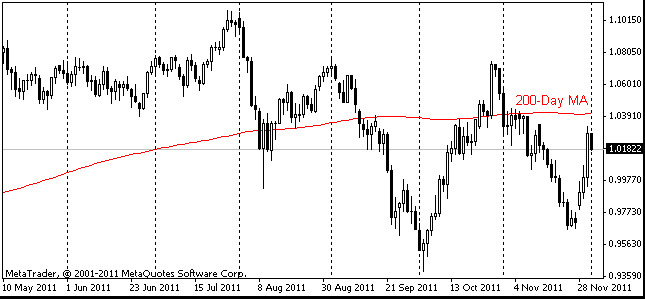EUR/usd
Private lenders have agreed to write off the Greek debt by 53.5%, though earlier it was negotiated to cut the nominal face value by 50%, which corresponds to the 70% loss of the net present value. In addition, it's been reported that an agreement on the second bailout package was also reached. Actually, rumours about a good state of affairs were circulating around the market all day yesterday, thus maintaining a high demand for the euro. The single currency got stronger yesterday and is now trading near 1.3270, compared with Monday's opening level of 1.3150. Now it's possible to say that risks of the unfavourable turn of events have significantly decreased, but this still doesn't make up for the weakness of the economies, now facing considerable cuts in spending. However, the market is likely to celebrate the deal first and only then will switch over to this issue. We remind that the market now abounds in the euro short positions. Now EUR/USD is close to local highs, which means that the upward movement will trigger a wave of stop-losses. This, in its turn, may give rise to a wave of spikes, which can easily bring the euro to 1.35 after breaking the 1.33 level.

GBP/USD
The news from Greece has produced an invigorating effect on the pound as well. However, overnight the pair closed the gap, which started to form since the opening on Monday, but then it continued to move upwards again. Currently the pair is trading at 1.5845 and pound-bulls have good chances to drive it up to new local highs. For the most part of February GBP/USD has been under the banner of correction, but now the correction seems to be completed, which can in the long run boost the growth of the pound against the dollar. In fact, it is the single currency that has a great potential for growth in the EUR / GBP pair. The pair stopped declining in the area of two-year lows and now may bounce up on the improving sentiments around Greece.

USD/JPY
The Japanese yen doesn't even think to stop falling. It looks as if the players took the change in the BoJ's attitude to inflation targeting rather seriously. Moreover, as we know, the Japanese exports leave much to be desired now, which also tells badly on the capital inflow. As we have already pointed out, the yen should be cheaper because, on the one hand, the country needs money to recover and, on the other hand, exports are now sharply decreasing due to the shift of production to the regions with cheaper labour force.

AUD/USD
The Australian dollar seems to be rather vulnerable, despite the general triumph in the markets. It really comes as a surprise and as such shows the strength of the aussie bears. The meeting minutes, published in early February, make it clear that the Bank will reduce rates only if external factors get worse(for example, if the situation in Europe will deteriorate). Besides, in the minutes it is emphasized that the inflation holds in the target corridor, growth is close to the trend levels, and loan rates approach their ten-year average levels. The Australian economy remains one of the most dynamic ones, simply for some time the speculators' attention will be switched over to the euro and the yen.
